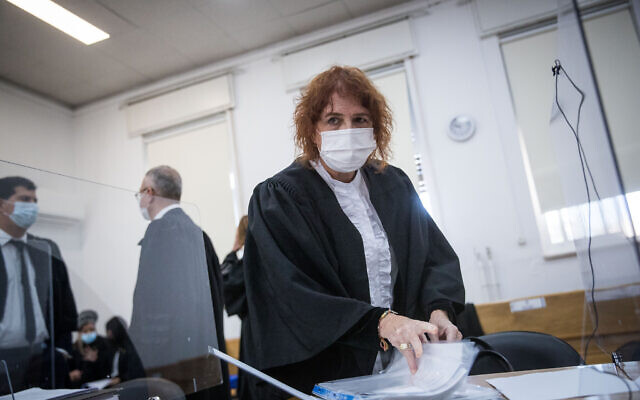Prime Minister Benjamin Netanyahu’s corruption trial resumed on Sunday, with his lawyers asking the Jerusalem District Court to dismiss the charges against him due to alleged impropriety by police investigators probing the premier, and the judges indicating they intended to order prosecutors to explain why some parts of the indictment were not sufficiently detailed.
Such a decision would likely require prosecutors to correct the indictment, resulting in another significant delay in the schedule of the trial. The start of the evidentiary stage has already been pushed off by a month.
Netanyahu’s trial on charges of fraud, breach of trust and accepting bribes opened in May. Though the prime minister attended the first hearing, he was granted an exemption from appearing at later, largely procedural stages of the trial, including Sunday’s hearing.
Sunday’s hearing began with procedures relating to Case 4000 — the most serious of the three cases against Netanyahu and the only one carrying a bribery charge — in which the premier is accused of approving regulatory moves benefiting Shaul Elovitch, the controlling shareholder of the Bezeq telecommunications group, in return for positive news coverage from the Elovitch-owned Walla news site.
It also discussed Case 1000, in which Netanyahu is accused of accepting some $200,000 in gifts such as cigars and champagne from two billionaires — Hollywood-based Israeli movie mogul Arnon Milchan and Australian magnate James Packer.
Due to coronavirus limitations, only three attorneys per defendant were allowed in the courtroom Sunday. Journalists were kept out of the room but were given access to a media screening in an adjacent courtroom.
An expanded courtroom is reportedly being constructed to accommodate more people for the coming stages of the trial. The trial marks the first time a prime minister has been indicted while in office, and a large audience is expected when the evidentiary stage begins in February.
Netanyahu denies any wrongdoing and has railed against the courts, prosecution, and media for what he terms a “witch hunt.”

Prime Minister Benjamin Netanyahu, centre, with his lawyers in the courtroom, as his corruption trial opens at the Jerusalem District Court, May 24, 2020. (Ronen Zvulun/ Pool Photo via AP)
His lawyers have repeatedly moved to delay and discredit the proceedings, filing complaints against the prosecution, alleging “criminal tactics” had been used against them, calling for changing the indictment against the prime minister, and, on Sunday, claiming that police investigators had used illegitimate means to secure evidence, thus disqualifying the charges.
“The investigators carried out extremely improper and grave investigative malpractices,” Boaz Ben Tzur, a lawyer for Netanyahu, argued Sunday, claiming that “witnesses were pressured to provide versions of events that the investigators wanted: by threatening to limit contact with their family and children, by denying rights, harassment, shouting.”
According to Ben Tzur, investigators repeatedly silenced witnesses who disagreed with them and in some cases refused to accept and collect “unequivocal evidence” that contradicted the indictment.
“These improper means must not be recognised in a law-abiding democratic state that sanctifies human rights,” he said.
More specifically, he argued that the charge sheet doesn’t include a detailed list of Netanyahu’s requests for changes in Walla’s coverage and of the gifts the premier and his wife, Sara, received from Milchan and Packer.

Liat Ben-Ari, plaintiff in the trial against Prime Minister Benjamin Netanyahu, arrives at the Jerusalem District Court for a hearing on December 6, 2020. (Yonatan Sindel/Flash90)
“We are under fog of war,” said Ben Tzur. “We need to understand what is the element that takes us away from the realm of legitimate discourse [in the talks with Walla]. There is a difficulty in that we don’t know what the crux of the disagreement is.”
Justice Oded Shacham appeared to accept that argument.
“The defendants are allowed to know what the coverage demands that were heeded are and are allowed to receive a general picture,” he said during the hearing. “The lack of a breakdown requires an explanation.”
Fellow judge Moshe Bar-Am concurred, saying the breakdown was “very relevant.”
Judith Tirosh of the State Prosecutor’s Office argued that “in many cases, we don’t detail every single thing. The story is included clearly in the indictment, and it isn’t supposed to map the investigation material. The goal is to tell the story to the defendant so that they know what they face.”
Prosecutor Liat Ben-Ari said investigators know what was bought for Netanyahu in Case 1000 and for what prices, but not what was actually given to him or when.
Netanyahu’s lawyers have also claimed that the indictment had been filed while the premier had immunity from prosecution, even though it was filed after Netanyahu said he was withdrawing a request for the Knesset to grant him immunity.
Answering a question from Judge Rivka Friedman-Feldman why that claim was only being made now, almost a year since the indictment was filed, Netanyahu lawyer Amit Hadad said: “What should he have done during this year, a rain dance? The only place to make that argument is here.”
In response to Friedman-Feldman’s question why Netanyahu had announced he was giving up the immunity bid, Hadad said: “He didn’t announce. His announcement is not an announcement. It has no import from a legal point of view.”
Last month, the court delayed the start of the evidentiary stage from January to February. The court said that witness testimony would be pushed off by a month and that precise dates would be determined later.
Related posts:
Views: 0
 RSS Feed
RSS Feed

















 December 6th, 2020
December 6th, 2020  Awake Goy
Awake Goy 




 Posted in
Posted in  Tags:
Tags: 
















